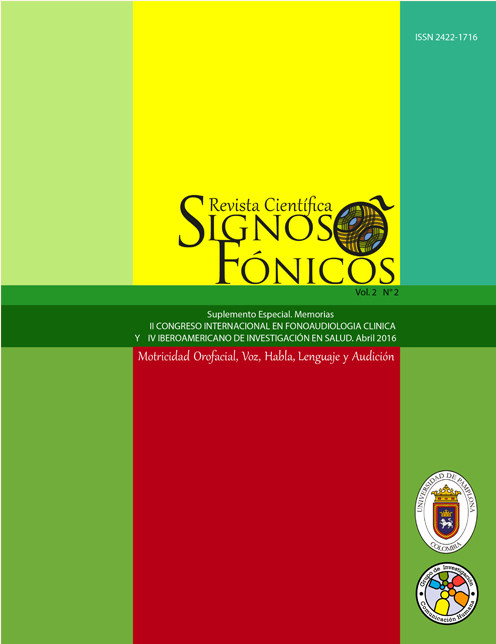Protocolo de intervencion desde una perpectiva Psicolinguistica: “propuesta para escolares en proceso de adquisición de la lectura y escritura”
DOI:
https://doi.org/10.24054/rcsf.v2i2.2119Palabras clave:
Fonoaudiología, Aprendizaje, Enfoque PsicolingüísticoResumen
Introduccion: OBJETIVO: Diseñar una propuesta de intervención innovadora bajo una perspectiva psicolingüística para los niños y niñas que se encuentran iniciando su proceso de adquisición de lectura y escritura. METODO: Empleando una metodología de investigación cualitativa. La investigación cualitativa trata de identificar la naturaleza profunda de las realidades, su estructura dinámica, aquella que da razón plena de su comportamiento y manifestaciones. Para ello se propone el diseño de un protocolo basado en estrategias terapéuticas encaminadas a la intervención en la adquisición y como prerrequisito para el proceso de la lectura y escritura en niños de 5 a 6 años de edad, distinguiendo desde una perspectiva psicolingüística (Habilidades cognitivas, metalingüísticas, lógico verbales, perceptivas y motoras) La investigación se desarrolla bajo una línea transversal puesto que se recolectan datos en un solo momento o en un tiempo único correspondiente a un periodo de 8 semanas, el enfoque es experimental la literatura dice que en este enfoque el investigador provoca al menos una causa y analiza sus efectos o consecuencias por tanto que Como técnica se va utilizar la revisión de literatura. Así mismo la implementación del consentimiento informado para la aplicación del mismo. RESULTADOS: Protocolo de intervención de la lectura y escritura desde una perspectiva psicolingüística, el cual tiene por objetivos orientar desde un marco conceptual los principios cognitivos - lingüísticos y así orientar las estrategias y tareas que deben estar dentro del protocolo de intervención para ser implementado por los estudiantes de formación en consulta externa o en sector educativo. CONCLUSIONES: (1) El protocolo permite adquirir habilidades para la lectura y la escritura de una forma dinámica desarrollando destrezas psicomotrices, auditivas, visuales, cognitivas y lingüísticas. (2) Los niños que presentan fallas a nivel neuromotor afecta no solo el lenguaje sino el desarrollo del proceso lector escrito. (3) El desarrollo de las habilidades psicolingüísticas es el resultado de un proceso de maduración sistemático de habilidades integrales que favorecen el desempeño escolar.
Descargas
Descargas
Publicado
Número
Sección
Licencia
Derechos de autor 2016 Aura Jazmin Matinez, Luisa Fernanda García, Robinson Eduardo Castañeda

Esta obra está bajo una licencia internacional Creative Commons Atribución-NoComercial-SinDerivadas 4.0.











